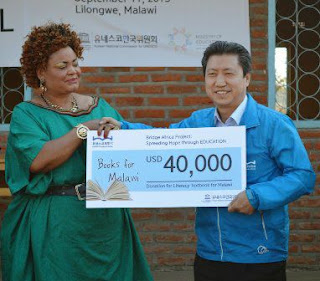 |
| Mutharika and Mundell |
Government of Scotland says is going to assist Malawi with £4.5 million translating to K63 billion, to assist the country on humanitarian response for the population which was adversely affected by droughts and floods.
David Mundell, MP, Secretary of State for Scotland told Journalists after holding camera talks with President Peter Mutharika at Kamuzu Palace in Lilongwe that Scotland would like to help Malawi with money which will be used to buy food for the flood victims.
"We are increasing our humanitarian support to Malawi by donating £ 4.5 million. This support is for the procurement of food for the people who are facing hunger due to floods"
He explained that Scottish Government is through this humanitarian response going to work with the World Food Programme (WFP) in the procurement and distribution of the food to vulnerable Malawians.
This announcement brings the UK’s humanitarian support in Malawi since October 2015 to £14.5m. In total, the UK’s £14.5m support will ensure: The World Food Programme (WFP) can deliver emergency food packages including basic rations of maize and nutrient-rich cereals for over 800,000 people; UNICEF can undertake mass screening of up to 800,000 children to identify urgent nutritional support needs; A Save the Children-led consortium can provide small cash transfers to over 450,000 people to buy basic food supplies for their families at food markets, helping stimulate local maize and other food markets. WFP and UNICEF can provide specialist supplies for up to 140,000 people suffering from acute malnutrition, including children under five, pregnant women and people who are HIV-positive or suffering from tuberculosis; Vital protection support to vulnerable people, including women and girls, in displacement and refugee camps through the United Nations High Commissioner for Refugees Support to improve livelihoods for some of the most vulnerable households, including vaccinations for over 150,000 livestock through the United Nation’s Food and Agriculture Organization.
Mundell also promised that Scottish Government will continue to support Malawi in several areas including health, education agriculture among others.
"Even though there might be some changes in donors approach but UK will continue with its support to support Malawi through number of areas that it is supporting. We are supporting the building blocks of Malawi but we rely on Malawians to lead the self efficiency” he added
During talks with President Mutharika, the Scottish Secretary of State said his Government welcomes Malawi's agenda of reforms and investments and expressed hope that investors from Scotland will also look into investment opportunities that Malawi has and hoped that president Mutharika's visit to Scotland later this year will offer opportunity for him to connect with prospective investors.
Scottish Secretary of state said was delighted to be in Malawi and believes that his visit will strength ties with Malawi and also promised that Scotland will “remain strong partner of Malawi”
The news of this assistance has been warmly welcomed by Malawi Government.
Minister of Foreign Affairs George Chaponda described the Scottish Government gesture as "true friend indeed"
"On behalf of Malawi Government I would like to appreciate the Scottish Government for this timely assistance."
He said this support will go along way at this time when the country is still looking for humanitarian support for 2.8 million people who are in need of food support following the adverse climate condition which caused reduction in food production in the country.
Chaponda further noted that as government is trying its best to make available of maize through ADMARC, therefore the support from Scotland will further give assurance of food availability throughout the year.
Earlier, President Peter Mutharika described the visit as “Clear testimony for cordial and bilateral relations with Scotland”
He said Malawi continues to enjoy long history with Scotland of 175 years and also appreciates continued support it receives from Scotland through Malawi Scotland Partnership and in number of areas including health, education among others.
He informed the Scottish Minister of climatic challenges that Malawi is experiencing to extent that there is significant reduction in country's food production as well as how his government is tirelessly trying to resolve the problem among others by crop diversification and taking several measures that mitigates climate change effects.
"We had unprecedented floods in some parts of the country, and dry spells in others. Consequently our national output dwindled significantly. So reduced , was the amount of food and export crop, and this led to significant macroeconomic challenges. My government appealed for humanitarian food assistance to the tune of US$146 million to avert the critical food shortages and so far, we have received support approximately US$100 million, with a shortfall of US$46 million.We are still looking for additional support to close the gap.
In our view, in order to avert the perennial droughts and dry spells, my government needs to aggressively embark on diversifying our economy through, among others, revamping the irrigation sub sector, through the Green Belt Initiative (GBI)." He said
He further mentioned number of measures on macro-economic stability to restore Malawi economy now going through difficult time.
"On the macroeconomic side, our low export earnings have translated into high inflation, high interest rates and depreciating currency. My government has, therefore, put in place measures to restore macroeconomic stability, through tight fiscal and monetary policies, as well as expediting implementation of Public Financial Management Reforms.
He continued "My government is prioritising skills development among our youth, through the establishment of Technical Community Colleges. This is to take advantage of the youth bulge of our country and ensure that they are properly trained and skilled to contribute better to economic growth. We believe this is an area too that Scotland can support us.
Honourable Minister, we will certainly invite Scotland to assist Malawi in industrial and technological development, through technical assistance and capacity building programmes." He said and appealed that further support from Scotland in all these areas to Malawi is welcome.
"My government also aims at improving our ranking on Cost of Doing Business. I am pleased to report, Honourable Minister, that for the first time in many years, Malawi has made recognisable improvements. According to the World Bank Business Index for 2016, Malawi has now been ranked 141 from 164 out of the 189 global economies. However, our main target is to achieve 100 top ranking as soon as possible." He said
He among others highlighted his Government efforts of wooing investors into the country and said Malawi recall promise made by Scottish investors and and that the Scottish Government agreed to set up an investment fund named ‘The African Lakes Corporation’ in memory of John and Fredrick Moir, to promote Scottish investments to Malawi. He, therefore said is hopeful that this initiative will be realized soon.
The Secretary of State for Scotland, David Mundell, will make a three-day visit to Malawi from 16 th to 18 th February 2016. Mr Mundell’s visit will further promote the strong ties between the UK and Malawi, and the close historical and modern relationship between Malawi and Scotland in particular.
While in Malawi, Mr Mundell will meet staff and partner organisations working to deliver the £80m UK Aid development programme, including those involved in providing the humanitarian response to Malawi’s current maize shortage. Mr Mundell will also meet a wide range of individuals and groups who contribute to the breadth of the UK - Malawi bilateral relationship, and those involved in promoting ever deeper Scotland – Malawi ties, such as the Malawi- Scotland Partnership.
He will also launch the next phase of the British Council’s Connecting Classrooms programme, which has included exchanges with schools in Scotland.
In his engagements with the Malawi Government, Mr Mundell is expected to highlight close cooperation with Malawi across a range of bilateral, regional and international issues and to encourage progress on the process of wide-ranging reform under the Government of President Mutharika.




















